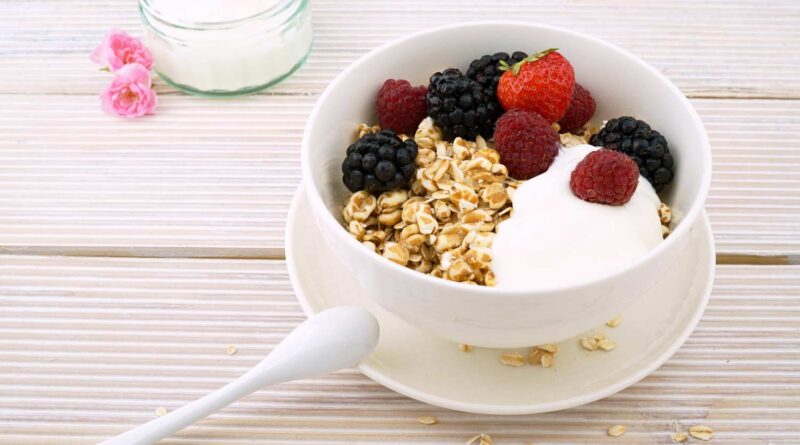Beyond Yogurt: 7 Ways to Boost Your Gut Microbiome for Better Health
Gut microbiome is a term used to describe the complex community of bacteria, fungi, and other microorganisms that live in our digestive tract. These tiny creatures play an essential role in maintaining good health by breaking down food, producing vitamins, and supporting the immune system. In this article, we will explore seven ways you can boost your gut microbiome for better health.
Introduction to the Gut Microbiome
The human body contains trillions of microbes, with most of them living in the gut. The gut microbiome is unique to each individual and changes over time based on factors such as diet, stress levels, medication use, and environmental exposure. A healthy gut microbiome should be diverse, meaning it has many different types of bacteria, with some being more dominant than others.
What is a Healthy Gut Microbiome?
A healthy gut microbiome is one that is balanced and diverse. When there is an imbalance or lack of diversity in the gut microbiome, it can lead to various health issues including inflammation, autoimmune diseases, obesity, and mental health disorders. To achieve a healthy gut microbiome, it’s crucial to eat a varied and nutritious diet, manage stress levels, avoid excessive antibiotics usage, and get enough sleep.
The Importance of Diversity in Your Gut Microbiome
Diversity in the gut microbiome is critical because it allows for the breakdown of a wide range of foods, production of essential nutrients like vitamin K and B12, and regulation of the immune system. Studies have shown that people with a less diverse gut microbiome are at higher risk of developing chronic conditions such as type 2 diabetes, heart disease, and certain forms of cancer.
Foods That Boost Your Gut Microbiome
Certain foods contain prebiotics and probiotics which help promote the growth of beneficial bacteria in the gut. Prebiotic-rich foods include whole grains, fruits (such as bananas, apples, and berries), vegetables (like garlic, leeks, and onions), nuts, and seeds. Probiotic-rich foods include yogurt, kefir, sauerkraut, kimchi, tempeh, and miso soup. Additionally, consuming fermented foods like kombucha and apple cider vinegar may also support gut health.
Probiotics and Prebiotics for a Healthier Gut
Probiotics are live microorganisms that provide health benefits when consumed in adequate amounts. They can be found in supplement form or naturally occurring in fermented foods. Prebiotics, on the other hand, are non-digestible fibers that serve as fuel for the beneficial bacteria in the gut. Both probiotics and prebiotics work together to create a healthy gut environment.
Learn how to make your own sourdough bread, kombucha and water kefir. Plus bonus recipes and videos on how to make sauerkraut, kimchi, pickles, coconut yogurt, and salsa!
Lifestyle Changes to Improve Your Gut Health
In addition to eating a nutritious diet, managing stress levels, getting enough sleep, and exercising regularly can all contribute positively to gut health. It’s also essential to limit the intake of processed and high sugar foods, reduce alcohol consumption, quit smoking, and minimize exposure to environmental toxins.
Conclusion: Taking Care of Your Gut Microbiome
Taking care of your gut microbiome is vital for overall health and wellbeing. By incorporating prebiotic and probiotic-rich foods into your diet, practicing stress management techniques, and making lifestyle adjustments, you can promote a diverse and balanced gut microbiome. Remember, a healthy gut equals a healthy you!
- Consume a diverse range of fiber-rich foods: Include a variety of fruits, vegetables, whole grains, legumes, and nuts in your diet. These foods provide prebiotic fibers that nourish beneficial bacteria in your gut.
- Eat fermented foods: Incorporate fermented foods like yogurt, kefir, sauerkraut, kimchi, and tempeh into your diet. These foods contain live bacteria that can help populate your gut with beneficial microbes.
- Limit processed foods and added sugars: Highly processed foods and excessive sugar intake can negatively impact your gut microbiome. Aim to consume whole, unprocessed foods and minimize added sugars in your diet.
- Stay hydrated: Drinking enough water is essential for maintaining a healthy gut. Hydration helps with digestion and supports the movement of waste through the digestive system.
- Manage stress levels: Chronic stress can disrupt the balance of your gut microbiome. Engage in stress-reducing activities like exercise, meditation, or spending time in nature to promote a healthy gut.
- Get regular physical activity: Exercise has been shown to positively influence the composition of the gut microbiome. Aim for at least 150 minutes of moderate-intensity exercise per week.
- Consider probiotic supplements: In some cases, probiotic supplements can be beneficial for restoring and maintaining a healthy gut microbiome. Consult with a healthcare professional before starting any supplements.
Remember, everyone’s gut microbiome is unique, so it’s important to listen to your body and make changes that work best for you.





